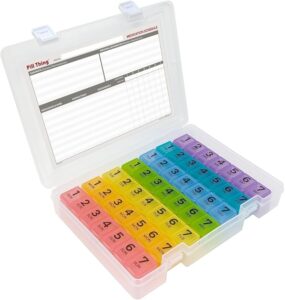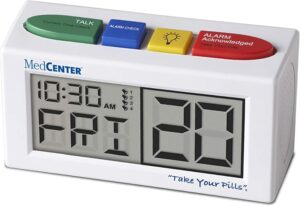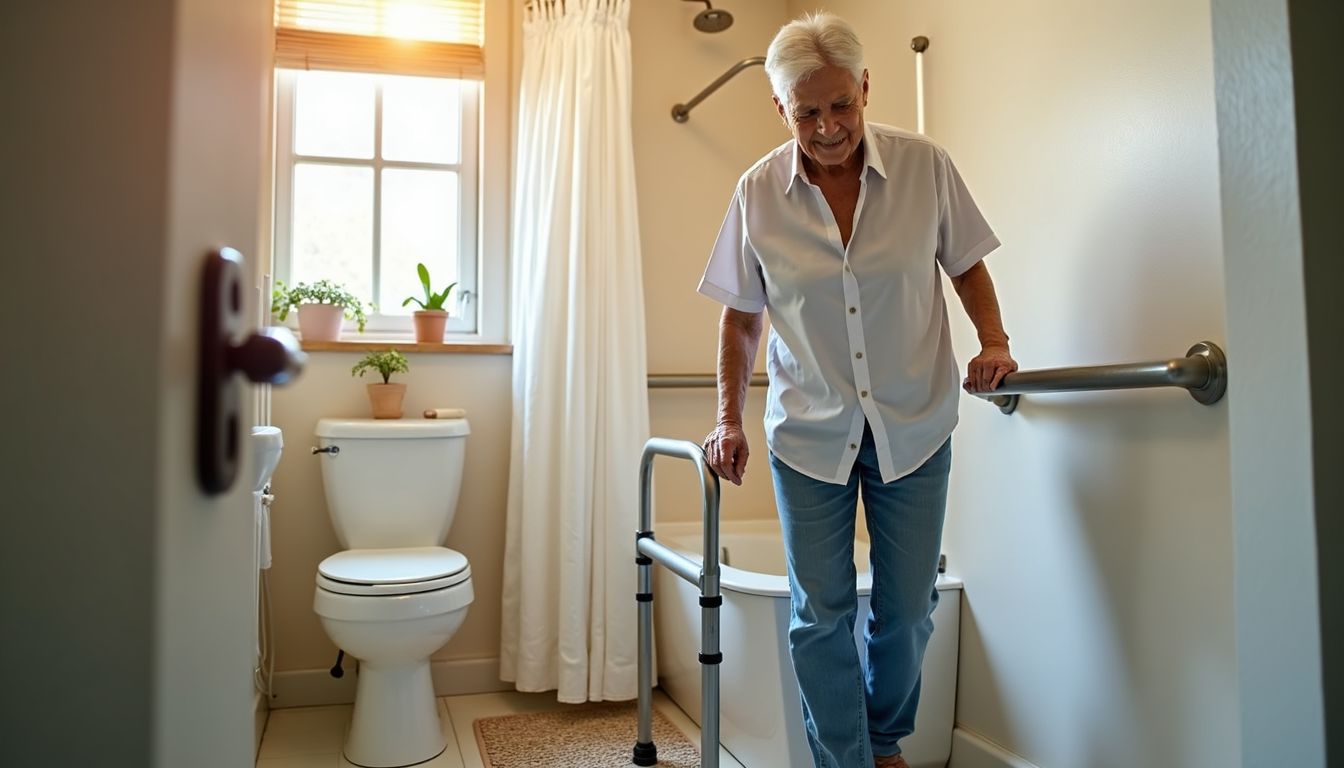Medication management tips for seniors and caregivers are essential for maintaining health, preventing medication errors, and ensuring treatment effectiveness. Managing multiple prescriptions can be challenging, especially for older adults dealing with chronic conditions. With proper organization, reminders, and caregiver support, seniors can take their medications safely and on time—leading to better health and peace of mind.
That’s where proper medication management comes in. When seniors and caregivers create a structured routine, it ensures medicines are taken safely, on time, and in the correct dosage. A well-organized system not only reduces errors but also builds peace of mind for the entire family.
Technology has made this process much easier in recent years. Smart reminder devices and digital pill organizers are becoming essential tools for aging adults who want to stay independent while managing multiple medications. For example, modern smart pill dispensers can automatically alert users when it’s time to take medicine — and even send notifications to caregivers.
If you’re looking for the best tools to simplify this process, check out our detailed review on Best Pill Reminder Devices in 2025, where we’ve compared easy-to-use options for seniors.
Medication management isn’t just about staying on schedule — it’s about empowering seniors to take control of their health with confidence and safety.
Common Challenges Seniors Face in Taking Medication
Even with the best intentions, many seniors struggle to stay consistent with their medications. Age-related changes, complex prescriptions, and simple forgetfulness can all make it harder to follow a daily routine. Understanding these challenges is the first step toward finding the right solutions.

1️⃣ Forgetfulness and Cognitive Decline
Memory issues are one of the biggest reasons seniors miss doses or take them twice. Conditions like mild cognitive impairment or early-stage dementia can make it difficult to remember whether a pill was taken. That’s why visual aids and smart reminders play a vital role in senior medication care.
💡 Related read: Top Smart Pill Organizers for Seniors – discover devices that use alarms and light signals to prevent missed doses.
2️⃣ Poor Eyesight or Hearing Loss
Many medication labels are printed in small fonts, and instructions can be confusing. Poor eyesight or hearing makes it easy to mix up pills, especially when bottles look similar. Using large-print labels, color-coded organizers, or talking pill boxes can make daily use much safer.
3️⃣ Complex Dosage Schedules
Some medications must be taken before meals, others after — and some multiple times a day. Managing 5–6 different prescriptions with varying times can be overwhelming, even for caregivers. A clear, written schedule or a digital medication tracker app can reduce confusion.
For detailed safety guidelines, you can refer to the CDC’s guide on Medication Safety for Older Adults.
4️⃣ Similar-Looking Pills and Packaging
Many over-the-counter and prescription pills have identical colors and shapes, which can lead to mix-ups. This is particularly risky when two medications have opposite effects — for example, a sedative and a blood pressure tablet. Storing each medication in separate, clearly labeled compartments helps avoid these mistakes.
5️⃣ Lack of Caregiver Oversight
Seniors living alone often don’t have anyone to remind or verify doses. Even when caregivers are present, managing multiple prescriptions across different times of day can be confusing. Setting up a weekly pill organizer or using smart alerts shared with caregivers can make oversight easier and safer.
How to Build a Simple Medication Routine
When it comes to medication management, simplicity is the secret to consistency. Most seniors miss doses not because they don’t care — but because their routines are unclear or overly complicated. A little structure can go a long way toward building healthy habits that last.

1️⃣ Stick to a Consistent Schedule
Taking medicines at the same time every day helps build muscle memory. Try linking medication times to familiar daily habits — for example, after breakfast, with evening tea, or before bedtime. This small change makes it easier to remember without setting multiple alarms.
If you’re helping a parent or grandparent, encourage them to keep a visible routine chart near their dining area or bedside. You can even use simple reminder apps or smart pill organizers that alert both the senior and caregiver when it’s time. Check out our comparison of Top Smart Pill Organizers for Seniors for options that make this process effortless.
2️⃣ Use a Weekly Planner or Pill Box
A weekly pill organizer is a game-changer for seniors managing multiple medications. Each compartment can represent a specific day or time slot (morning, afternoon, night). This visual layout reduces confusion and provides a clear sense of progress throughout the week.
Some advanced models even come with digital timers, voice reminders, or locking lids — perfect for those who take medications with strict timing requirements.
3️⃣ Keep a Written or Digital Medication Log
Maintaining a log with medication names, dosage times, and side effects can prevent accidental mistakes. Caregivers can check it weekly to ensure everything is on track. For tech-savvy families, using a shared Google Sheet or medication tracking app works great too.
For safe and practical guidelines on managing multiple prescriptions, you can refer to the NIH’s guide on Managing Multiple Medications Safely.
4️⃣ Involve Caregivers in the Routine
Caregivers play a key role in keeping things organized. Even a quick daily check-in can ensure no dose is missed or doubled. A weekly review of the medication box helps catch mistakes early and ensures refills are ordered on time.
Building a simple, repeatable system turns medication management from a stressful task into a smooth daily habit — protecting senior health while maintaining peace of mind for caregivers.
Role of Pill Organizers and Smart Devices
For most seniors, remembering to take medicine isn’t about unwillingness — it’s about memory, routine, and convenience. That’s where pill organizers and smart reminder devices make life simpler, safer, and stress-free.

1️⃣ Traditional Pill Organizers – Simple Yet Effective
Classic pill boxes are still one of the best low-cost solutions for medication management. With clearly labeled compartments for days and times, they allow seniors to visually confirm whether a dose has been taken. Many caregivers prefer this method because it’s easy to refill once a week and doesn’t require technology.
You can find pill organizers with large, easy-to-open lids and bold markings that are perfect for seniors with arthritis or low vision. They’re a must-have for anyone managing multiple daily prescriptions.
If you’re planning to buy one, our detailed guide on Best Pill Reminder Devices in 2025 includes both basic and smart options that work great for different needs.
2️⃣ Smart Pill Reminders – When Technology Meets Care
Today’s smart devices have changed the way seniors manage health. Smart pill reminders come with timers, sound alerts, and app connectivity, making them ideal for those who often forget doses or live alone.
Some advanced dispensers even send notifications to caregivers’ phones when a dose is missed. This two-way connection gives both seniors and their families peace of mind.
These devices aren’t just convenient — they also help maintain independence. Seniors can confidently manage medications on their own while still having caregiver oversight when needed.
3️⃣ Which One Should You Choose? Medication Management Tips for Seniors
It depends on the senior’s comfort level. For someone who prefers simplicity, a manual pill box works perfectly. For tech-friendly users or caregivers managing from a distance, a smart pill dispenser provides extra safety and tracking.
Either way, these tools help seniors stay consistent — which is the real key to effective medication management.
Tips for Caregivers Managing Multiple Prescriptions
For caregivers, managing several medications at once can be one of the toughest parts of senior care. Between dosage changes, refill schedules, and doctor’s instructions, it’s easy to feel overwhelmed. But with the right system, you can make the process both organized and stress-free — for yourself and your loved one.

1️⃣ Maintain a Master Medication List : Medication Management Tips for Seniors
Always keep an updated list that includes:
-
Medicine names and dosages
-
Purpose of each drug
-
Timing (morning, evening, after food, etc.)
-
Prescribing doctor and pharmacy details
This “master sheet” should be printed and kept handy — on the refrigerator, near the pill organizer, or shared digitally with other family members. It’s a quick reference point during emergencies or doctor visits.
If you want a detailed guide on balancing safety and independence while caregiving, check out our post on How to Help Aging Parents Stay Independent at Home
2️⃣ Use Shared Digital Tools : Medication Management Tips for Seniors
Caregivers can simplify communication and scheduling using shared reminder apps like Google Calendar or smartphone medication trackers. Some smart pill dispensers also let multiple users monitor doses in real-time, ensuring nothing is missed.
Even a shared WhatsApp reminder can go a long way for elderly parents living separately.
3️⃣ Organize Refills and Check Expiry Dates
Refilling on time prevents unnecessary gaps in medication. Set reminders for pharmacy refills and keep track of expiry dates every month. Discard old or unused medications safely to avoid mix-ups.
For reference, the FDA’s Medication Disposal Guidelines explain how to safely discard expired or leftover medicines.
4️⃣ Communicate Regularly with Doctors
Keep doctors informed about all active prescriptions, especially if multiple specialists are involved. This prevents conflicting medications or harmful drug interactions. Bring the medication list to every appointment for review.
Regular check-ins with a pharmacist can also help adjust dosages or suggest safer alternatives.
5️⃣ Build a Routine with Empathy
Most importantly, approach medication routines with patience and understanding. Seniors may resist help if they feel controlled. The key is to empower, not enforce. Gently encourage them to participate in the routine so they feel in charge of their health.
When caregivers combine organization, communication, and empathy, managing multiple prescriptions becomes a simple, caring routine — not a stressful responsibility.
Common Medication Mistakes & How to Avoid Them
Even with the best systems in place, seniors and caregivers can sometimes make small mistakes that lead to big problems. Recognizing these common errors early — and taking simple precautions — can prevent unwanted side effects, overdosing, or missed doses altogether.

1️⃣ Skipping Doses or Taking Them Twice
This is the most frequent mistake among seniors. Skipping doses reduces a medicine’s effectiveness, while double-dosing can cause serious side effects. To prevent this, stick to a consistent routine and use tools like smart pill reminders that track taken and missed doses automatically.
2️⃣ Confusing Similar Bottles or Pills
Many medications come in identical bottles or have similar pill colors, leading to accidental swaps. Use clear labeling with large text, or color-coded stickers for each prescription. Keep medications in separate storage areas when possible.
3️⃣ Using Expired or Improperly Stored Medicines
Expired medications may lose potency or become harmful. Always check expiry dates before refilling pill boxes. Store medicines in a cool, dry place — not in bathrooms where humidity can affect quality.
4️⃣ Stopping Medications Without Consulting a Doctor
Seniors sometimes stop taking medicines when they “feel better.” However, stopping too early — especially with antibiotics or blood pressure meds — can cause relapse or complications. Always confirm with a doctor before changing any dosage or routine.
5️⃣ Not Keeping Doctors Updated
When seniors visit multiple specialists, each may prescribe new drugs — and sometimes these medicines can interact badly. Keeping one central list of all active prescriptions ensures every healthcare provider stays informed.
For a broader safety approach, you can also refer to the CDC’s Medication Safety Tips for Older Adults, which highlights daily habits for safer medication use.
By addressing these small but critical areas, caregivers can dramatically improve medication safety — and give seniors the confidence to manage their health independently.
Creating a Safe and Consistent Routine
At the heart of effective medication management lies one simple goal — consistency. When seniors and caregivers work together to build a routine that fits naturally into daily life, it reduces stress, improves health, and restores confidence.
Start by organizing all medicines in one clean, well-lit area. Use weekly pill organizers to simplify sorting and track progress visually. Combine that with smart pill reminders or phone alerts to keep doses on time, even on busy days.
Caregivers should also review the routine regularly — checking refills, expiry dates, and dosage instructions. Open communication with doctors and pharmacists ensures there are no overlapping prescriptions or potential side effects.
And don’t forget the emotional side: turn medication time into a positive daily habit rather than a chore. Pair it with something comforting like morning tea, a short prayer, or a walk — these small associations make the process effortless and uplifting.
Final Thought 💭
Consistency builds confidence — and confidence builds independence. With the right mix of organization, modern tools, and compassionate care, seniors can take control of their medication routine and live healthier, worry-free lives every day.







